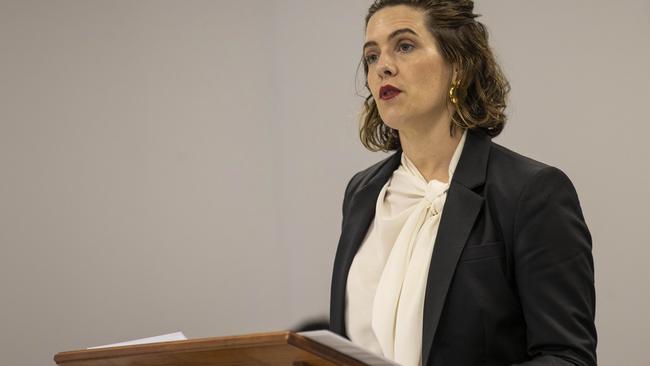‘Cover-up, wilful blindness, record destruction’ to be exposed by Tasmania child abuse inquiry
An inquiry will probe ‘terrible’ child sex abuse in Tasmania’s hospitals, schools, child protection and juvenile justice systems.

An inquiry will present allegations including cover-up, “wilful blindness” and destruction of records in response to “terrible” child sexual abuse in Tasmania’s hospitals, schools, child protection and juvenile justice systems.
In an opening hearing on Tuesday, the state’s equivalent of a royal commission heard abuse was more widespread than previously known at the state’s two largest public hospitals and its youth detention centre.
Marcia Neave, president of the Commission of Inquiry into the Tasmanian Government’s Responses to Child Sexual Abuse in Institutional Settings, said it had seized 21,000 documents and spoken to 100 individuals.
Commissioner Neave said public hearings, scheduled for February and March 2022, would hear “disturbing” evidence of “grief and despair” but also of “resilience and bravery” by abuse survivors.
“People sometimes think that child sexual abuse in institutional settings is a problem of the past; this is not true,” she told the opening hearing, in Hobart. “It is a terrible fact that some children continue to experience abuse and harm in settings where people believe they are safe.”
Counsel Assisting the inquiry, Maree Norton, said the commission’s work had already revealed that alleged abuse at key institutions was more recent and more widespread than previously known.
The commission would focus on “systemic reform” and hold “to account” some people in key positions for failures and “cover-ups”. “Adverse findings of misconduct are possible,” she said.
Ms Norton foreshadowed referral of matters to “police and other regulatory bodies” but also scrutiny of these organisations and potential need for their reform.
While much was already known about the abuse allegedly perpetrated by Launceston General Hospital paediatric nurse James Geoffrey Griffin, the commission was aware allegations against him may have been made as far back as the early 2000s.
In addition, it had learned that allegations at the LGH were “not limited” to Griffin, who committed suicide in 2019 after being charged with multiple child sex offences.
The commission had received information pointing to a “similar pattern” of failure to deal with child abuse allegations at the Royal Hobart Hospital, suggestive of “cultural and governance” issues in the health bureaucracy.
“We do expect this case study to raise uncomfortable questions, including about whether the response of individuals and institutions to allegations of child sexual abuse … might have involved negligence, wilful blindness or worse still deliberate cover up,” Ms Norton said.
The commission would examine allegations of “multiple perpetrators” among staff at the Ashley Youth Detention Centre, from the 1970s to the present day, as well as allegations of children abusing other children, of cover-up and destruction of records.
As well, there was evidence of failures in out of home care exposing children to the risk of abuse by adults as well as child perpetrators.
“It is the solemn hope of all involved in the work of this commission that it will be anything but just another inquiry,” Ms Norton said.
Commissioner Neave said due to delays beyond its control, the commission “may struggle” to meet its reporting deadline of August 31, 2022.
She urged the Tasmanian government not to delay implementing outstanding “vital” recommendations of the national responses to child sexual abuse royal commission, while awaiting the report.
“The community would be rightly concerned if changes developed to protect children were not put in place as soon as possible,” she said.



